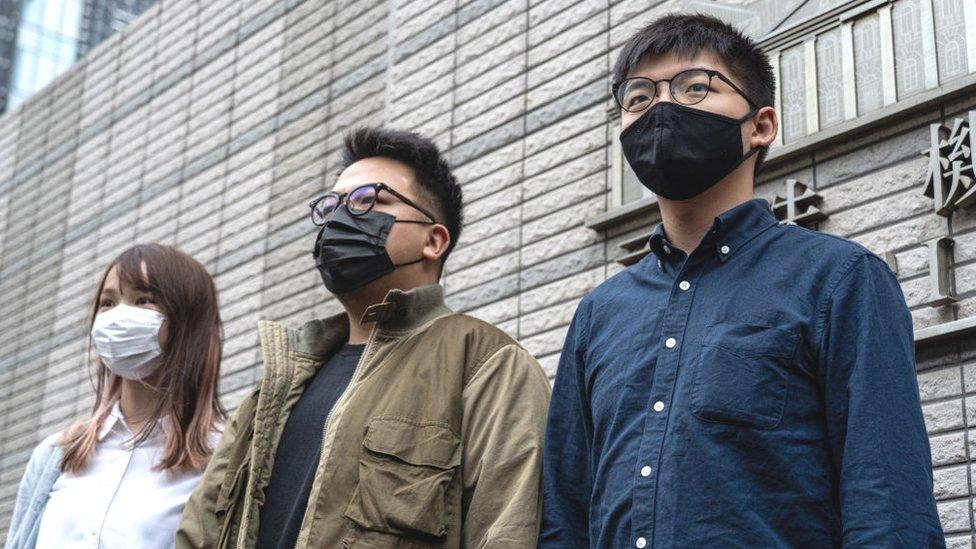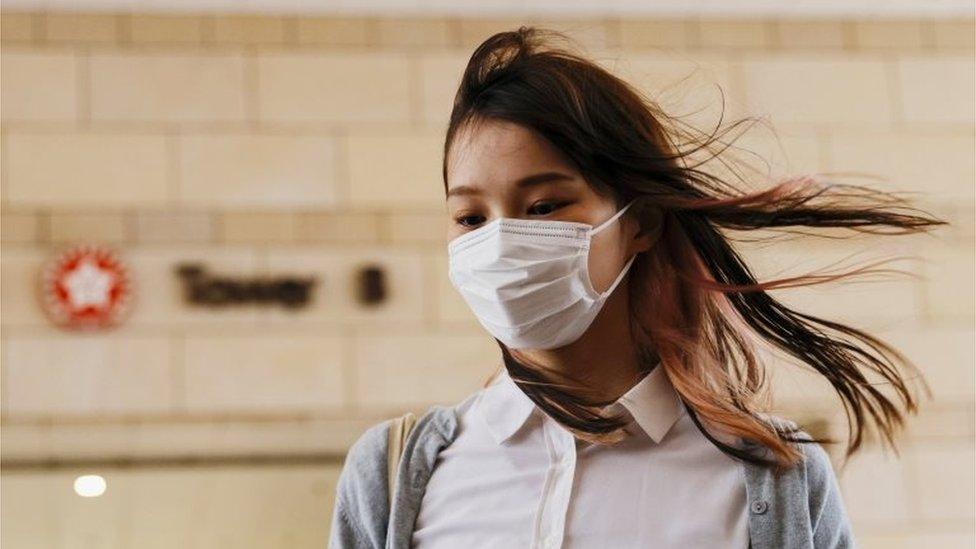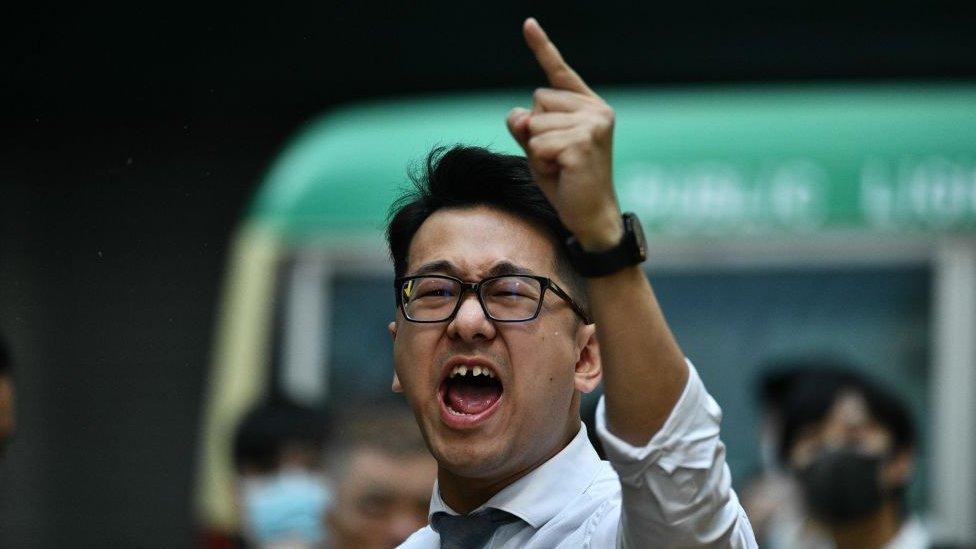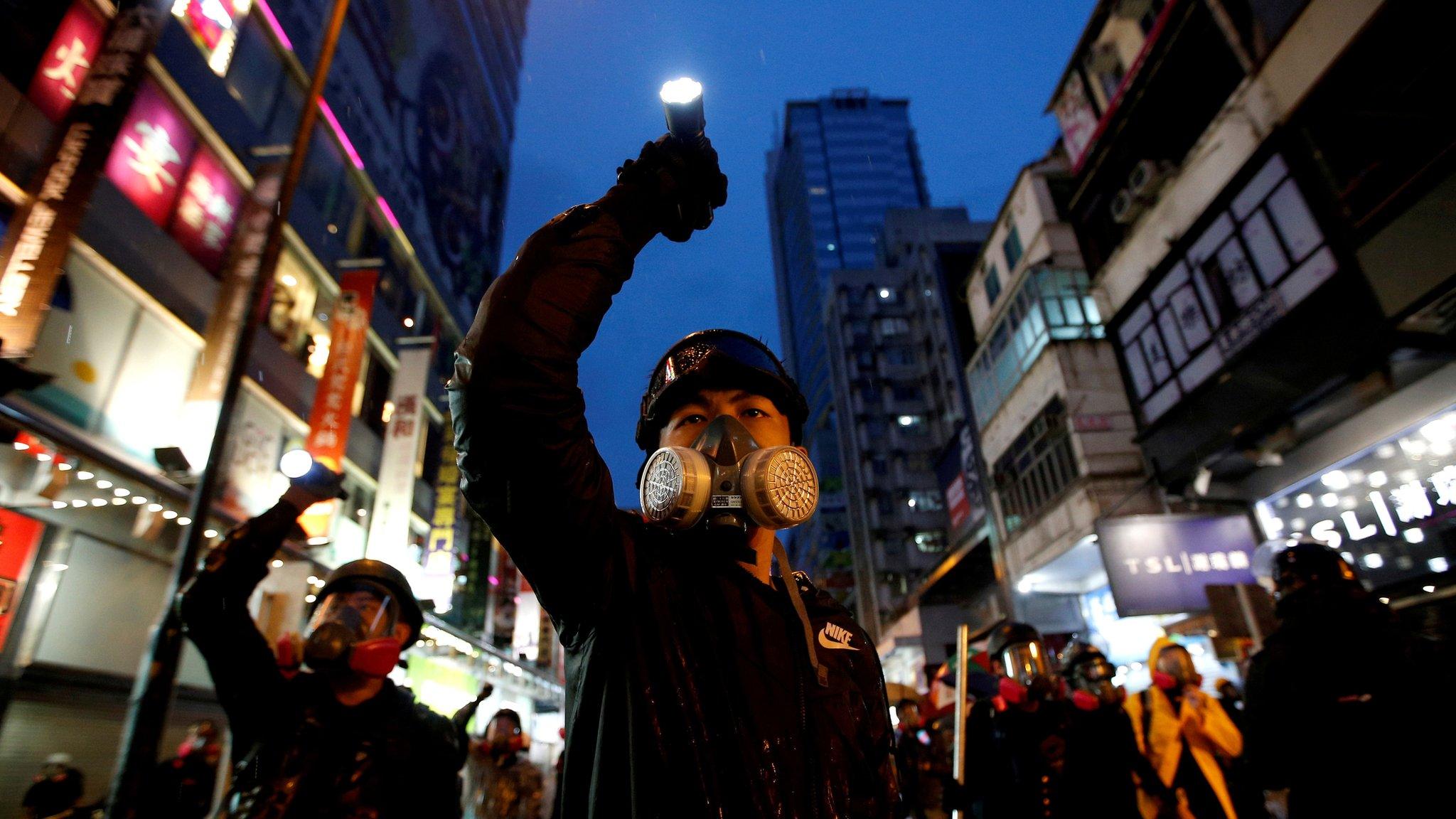Hong Kong: Joshua Wong and fellow pro-democracy activists jailed
- Published

Agnes Chow, Ivan Lam and Joshua Wong are prominent democracy activists
Hong Kong democracy activists Joshua Wong, Agnes Chow and Ivan Lam have been given jail sentences for their involvement in mass protests last year.
The trio, all in their twenties, were convicted of unauthorised assembly.
The pro-democracy movement has been stifled since Beijing introduced a controversial security law with harsh punishments.
But as their offences took place before the law's enactment, the activists have avoided a potential life sentence.
Wong - aged 24 and Hong Kong's best-known activist internationally - received a sentence of 13 and a half months in jail, while Chow, 23, and Lam, 26, will be imprisoned for 10 and seven months respectively.
The activists were remanded in custody until Wednesday's sentencing, with Wong placed in solitary confinement.
Later in the day, media tycoon Jimmy Lai, also an activist, was arrested on fraud charges. In August, a spectacular raid on the offices of his newspaper, Apple Daily, attracted global attention. At the time, he was arrested under the new security law but later released on bail.
Two other executives were arrested with him on Wednesday and police confirmed the action was linked to the August raid. Apple Daily is frequently critical of the Hong Kong authorities and the leadership in mainland China.
Jimmy Lai: China's security law 'spells the death knell for Hong Kong' (Interview from June 2020)
What happened in court?
All three of the young activists were convicted of organising and taking part in an unauthorised assembly near police headquarters at the start of the pro-democracy protests in June last year. They pleaded guilty to all charges last week.
"The defendants called on protesters to besiege the headquarters and chanted slogans that undermine the police force," Magistrate Wong Sze-lai was quoted as saying by news agency AFP. "Immediate imprisonment is the only appropriate option."
Allow X content?
This article contains content provided by X. We ask for your permission before anything is loaded, as they may be using cookies and other technologies. You may want to read X’s cookie policy, external and privacy policy, external before accepting. To view this content choose ‘accept and continue’.

Chow is said to have burst into tears when the sentence was read out. Wong shouted "the days ahead will be tough but we will hang in there" as he was led away, according to reports.
In comments posted on Twitter via his lawyers, Wong added: "We're now joining the battle in prison along with many brave protestors, less visible yet essential in the fight for democracy and freedom for HK."
Rights group Amnesty International condemned the ruling, saying it was a way for authorities to "send a warning to anyone who dares to openly criticise the government that they could be next".
"These three activists have been jailed in violation of their rights to freedom of expression and peaceful assembly," said Amnesty's Asia-Pacific regional director Yamini Mishra.
UK Foreign Secretary Dominic Raab urged the Hong Kong and Beijing authorities "to end their campaign to stifle opposition".
"Prosecution decisions must be fair and impartial. Rights and freedoms in Hong Kong must be upheld."
Who are the activists?
All three of them rose to prominence in the 2014 "Umbrella Movement" pro-democracy protests. Wong and Chow were still in their teens when they became student leaders.
One of Hong Kong's most recognisable dissidents, Wong has served several shorter prison sentences.
He also supported the new wave of protests that rocked the territory in 2019, which repeatedly led to violent clashes between demonstrators and police.
Joshua Wong and Akkarasorn Opilan spoke to the BBC last month about a new generation of Asian youth activists
Beijing has since introduced a sweeping new security law for Hong Kong with harsh punishment for acts of secession, subversion and collusion with foreign forces.
In response, Wong disbanded his political organisation Demosisto, which he had co-founded with Chow. Lam was a chairman of the group.
Chow, who some have nicknamed the "goddess of democracy", was also arrested under the new security law in August this year but was released on bail. She faces separate charges of "inciting secession".
What is Hong Kong's new security law?
A former British colony, Hong Kong was handed back to China in 1997 but under the so-called "one country, two systems" principle.
It was supposed to guarantee certain freedoms for the territory - including freedom of assembly and speech, an independent judiciary and some democratic rights - which mainland China does not have.
But earlier this year, China passed a controversial, far-reaching national security law in the territory after years of pro-democracy and anti-Beijing protests, which reduced Hong Kong's autonomy and made it easier to punish demonstrators.
Beijing says the law will return stability to the territory, but Western governments and human rights groups say it effectively curtails freedom of speech and protest.
After the law was introduced, a number of pro-democracy groups disbanded out of fears for their safety.
Writing in an opinion piece in the New York Times on Wednesday, two more pro-democracy activists, now living in exile, called on US President-elect Joe Biden to increase political pressure, external on China and Hong Kong authorities to stop the crackdown.
"If the world does not act resolutely to build a stronger alliance against the Chinese Communist Party's increasing aggression, more activists will be sacrificed, and more essential democratic values, too," warned Nathan Law and Alex Chow.
Hong Kong security law: The BBC's Stephen McDonell explains what it means, and what people there think
- Published23 November 2020

- Published1 December 2020

- Published31 August 2020

- Published21 May 2020
